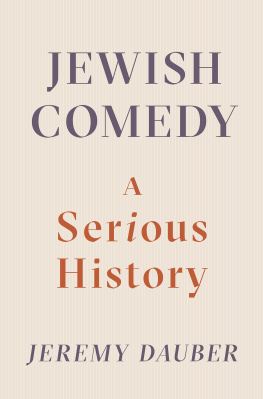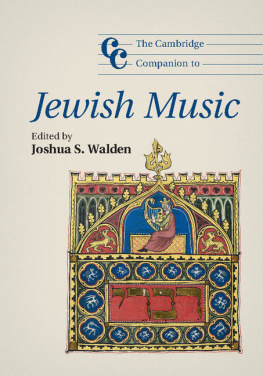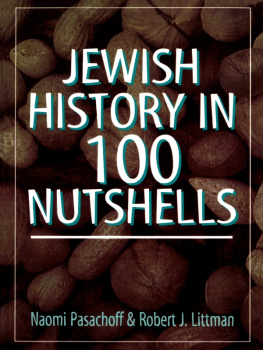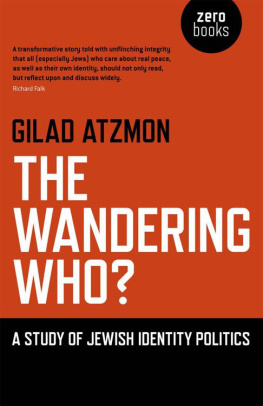PREFACE TO THE GERMAN TRANSLATION
Theauthor of the present essay, S. M. Dubnow, occupies a well-nighdominating position in Russian-Jewish literature as an historian andan acute critic. His investigations into the history of thePolish-Russian Jews, especially his achievements in the history ofChassidism, have been of fundamental importance in these departments.What raises Mr. Dubnow far above the status of the professionalhistorian, and awakens the reader's lively interest in him, is not somuch the matter of his books, as the manner of presentation. It israre to meet with an historian in whom scientific objectivity andthoroughness are so harmoniously combined with an ardent temperamentand plastic ability. Mr. Dubnow's scientific activity, first andlast, is a striking refutation of the widespread opinion thatidentifies attractiveness of form in the work of a scholar withsuperficiality of content. Even his strictly scientificinvestigations, besides offering the scholar a wealth of newsuggestions, form instructive and entertaining reading matter for theeducated layman. In his critical essays, Mr. Dubnow shows himself tobe possessed of keen psychologic insight. By virtue of this qualityof delicate perception, he aims to assign to every historical factits proper place in the line of development, and so establish thebond between it and the general history of mankind. This psychologicability contributes vastly to the interest aroused by Mr. Dubnow'shistorical works outside of the limited circle of scholars. There isa passage in one of his books[1] in which, in his incisive manner, heexpresses his views on the limits and tasks of historical writing. Asthe passage bears upon the methods employed in the present essay,and, at the same time, is a characteristic specimen of our author'sstyle, I take the liberty of quoting:
"Thepopularization of history is by no means to be pursued to thedetriment of its severely scientific treatment. What is to be guardedagainst is the notion that tedium is inseparable from the scientificmethod. I have always been of the opinion that the dulness commonlylooked upon as the prerogative of scholarly inquiries, is not aninherent attribute. In most cases it is conditioned, not by thenature of the subject under investigation, but by the temper of theinvestigator. Often, indeed, the tediousness of a learneddisquisition is intentional: it is considered one of the politeconventions of the academic guild, and by many is identified withscientific thoroughness and profound learning. If, in general,deadening, hide-bound caste methods, not seldom the cover for povertyof thought and lack of cleverness, are reprehensible, they are doublyreprehensible in history. The history of a people is not a meremental discipline, like botany or mathematics, but a living science,a magistra vitae ,leading straight to national self-knowledge, and acting to a certaindegree upon the national character. History is a science by the people, for the people, and, therefore, its place is the open forum, not thescholar's musty closet. We relate the events of the past to thepeople, not merely to a handful of archaeologists and numismaticians.We work for national self-knowledge, not for our own intellectualdiversion."
[1]In the introduction to his Historische Mitteilungen, Vorarbeiten zu einer Geschichte derpol-nischrussischen Juden .
Theseare the principles that have guided Mr. Dubnow in all his works, andhe has been true to them in the present essay, which exhibits in aremarkably striking way the author's art of making "all thingsseem fresh and new, important and attractive." New and importanthis essay undoubtedly is. The author attempts, for the first time, apsychologic characterization of Jewish history. He endeavors todemonstrate the inner connection between events, and develop theideas that underlie them, or, to use his own expression, lay bare thesoul of Jewish history, which clothes itself with external events aswith a bodily envelope. Jewish history has never before beenconsidered from this philosophic point of view, certainly not inGerman literature. The present work, therefore, cannot fail to provestimulating. As for the poet's other requirement, attractiveness, itis fully met by the work here translated. The qualities of Mr.Dubnow's style, as described above, are present to a marked degree.The enthusiasm flaming up in every line, coupled with his plastic,figurative style, and his scintillating conceits, which lend vivacityto his presentation, is bound to charm the reader. Yet, in spite ofthe racy style, even the layman will have no difficulty indiscovering that it is not a clever journalist, an artificer ofwell-turned phrases, who is speaking to him, but a scholar byprofession, whose foremost concern is with historical truth, andwhose every statement rests upon accurate, scientific knowledge; nota bookworm with pale, academic blood trickling through his veins, buta man who, with unsoured mien, with fresh, buoyant delight, offersthe world the results laboriously reached in his study, after allevidences of toil and moil have been carefully removed; who derivesinspiration from the noble and the sublime in whatever guise it mayappear, and who knows how to communicate his inspiration to others.
Thetranslator lays this book of an accomplished and spirited historianbefore the German public. He does so in the hope that it will shednew light upon Jewish history even for professional scholars. He isconfident that in many to whom our unexampled past of four thousandyears' duration is now terra incognita ,it will arouse enthusiastic interest, and even to those who, like thetranslator himself, differ from the author in religious views, itwill furnish edifying and suggestive reading. J. F.
Whatis Jewish History? In the first place, what does it offer as toquantity and as to quality? What are its range and content, and whatdistinguishes it in these two respects from the history of othernations? Furthermore, what is the essential meaning, what the spirit,of Jewish History? Or, to put the question in another way, to whatgeneral results are we led by the aggregate of its facts, considered,not as a whole, but genetically, as a succession of evolutionarystages in the consciousness and education of the Jewish people?
Ifwe could find precise answers to these several questions, they wouldconstitute a characterization of Jewish History as accurate as isattainable. To present such a characterization succinctly is thepurpose of the following essay.
THERANGE OF JEWISH HISTORY
Lepeuple juif n'est pas seulement considrable par son antiquit,mais il est encore singulier en sa dure, qui a toujours continudepuis son origine jusqu' maintenant S'tendant depuis lespremiers temps jusqu'aux derniers, l'histoire des juifs enferme danssa dure celle de toutes nos histoires.PASCAL, Penses ,II, 7.
Tomake clear the range of Jewish history, it is necessary to set down afew general, elementary definitions by way of introduction.
Ithas long been recognized that a fundamental difference exists betweenhistorical and unhistorical peoples, a difference growing out of thefact of the natural inequality between the various elements composingthe human race. Unhistorical is the attribute applied to peoples thathave not yet broken away, or have not departed very far, from thestate of primitive savagery, as, for instance, the barbarous races ofAsia and Africa who were the prehistoric ancestors of the Europeans,or the obscure, untutored tribes of the present, like the Tartars andthe Kirghiz. Unhistorical peoples, then, are ethnic groups of allsorts that are bereft of a distinctive, spiritual individuality, andhave failed to display normal, independent capacity for culture. Theterm historical, on the other hand, is applied to the nations thathave had a conscious, purposeful history of appreciable duration;that have progressed, stage by stage, in their growth and in theimprovement of their mode and their views of life; that havedemonstrated mental productivity of some sort, and have elaboratedprinciples of civilization and social life more or less rational;nations, in short, representing not only zoologic, but also spiritualtypes.[2]









